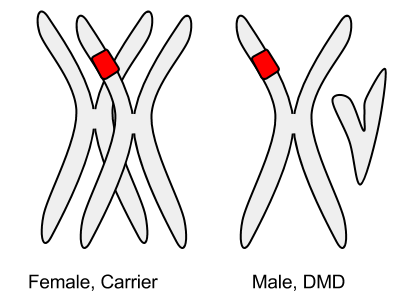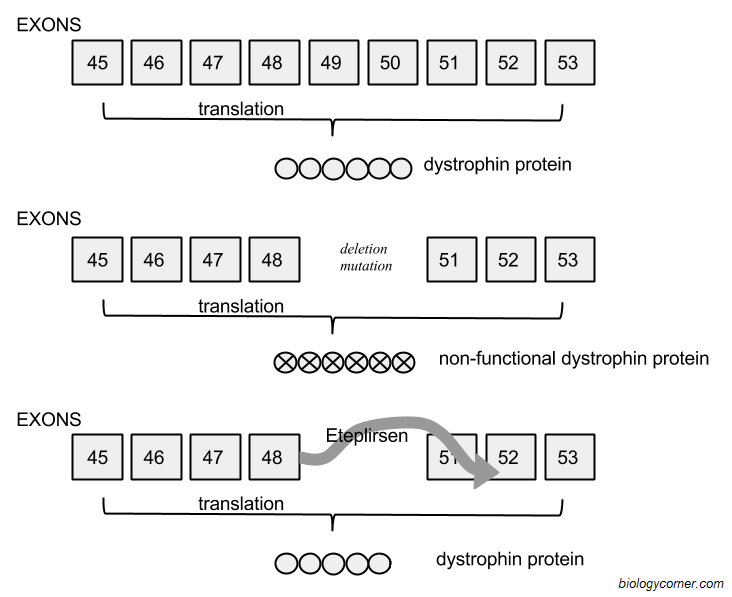Treating Genetic Disorders

Duchenne Muscular Dystrophy (DMD)is a genetic disorder that is caused by a gene located on the X chromosome. It affects about 1 in 3,600 boys. The reason it affects boys more than girls is because of the way sex chromosomes are inherited. Females receive two X chromosomes, they only need to have one working copy of the gene, so even if they carry the DMD gene, they will have a working copy on the other chromosome. Males have an X chromsome and a Y chromosome. If a boy inherits the DMD allele from his mother, he will not have another normal allele and will express the muscular dystrophy trait.

Symptoms usually appear in childhood, though a child can be tested for the trait at birth. Over time, muscle weakness affects the body, usually starting at the legs. Children will eventually lose the ability to walk by the age of twelve. Death usually occurs by the time the person has reached 25 years of age.
The actual cause of the muscle degeneration is due to the protein dystrophin. This protein connects muscle fibers to underlying tissue and insulates the muscle from damage. Lack of this protein results in muscle cell death, where those cells are replaced with fat or connective tissue. Recall that genes on chromosomes code for amino acids, which in turn build proteins. An error in the genetic code can result in a protein not being made correctly, or not made at all. While a person can inherit a faulty gene from their mothers, it is also possible for this section of DNA to have a spontaneous mutation, which can also result in the disorder.
In order to treat the disorder, you would either need to artificially make the protein required for insulating muscle cells, or repair the gene that makes the protein. There are several mutations that can result in muscular dystrophy, but a common one results from the deletion of a section of DNA, which then causes a frameshift mutation, making the gene unreadable by cellular machinary. Recall that during the processof transcription, DNA makes RNA, which travels to the ribosomes where the amino acids are assembled into a protein. Each 3 bases in the RNA sequence codes for an amino acid. If one of those bases are removed the whole reading frame shifts the protein cannot be made. Imagine if you read words 3 letters at a time....what would result in your reading if one of the letters were deleted?
T H E | C A T | A T E | T H E | R A T
If the first E were deleted, the words (and meaning) would change to:
T H C | A T A | T E T | H E R | A T
This is sometimes called a nonsense mutation.
One promising technology uses a drug to cause the machinery of the cell to skip the deleted portion, so that the protein created is a shorter version of dystrophin, but still functions to protect the muscle cells from damage. If you use the same analogy as above, the reading frame would say
T H E | C A T | A T E | R A T
While it's not perfect, it is no longer complete nonsense.
How Eteplirson Works

The drug may not work on all patients, as it depends greatly on the mutation of the gene. The dystrophin gene is one of the largest human genes, containing 79 exons. An exon is a portion of the gene that actually codes for the protein, sections that are interspersed with introns, or non-coding segments. Clinical trials of drugs that allow for exon skipping have shown promise in treating the disease. However, the drug will only work if the person has not already had muscle function severely compromised. The drug may protect damage to muscles, but it will not repair muscles that have already been damaged by the progression of the disease. Clinical trials are limit participants to those who are still able to walk.
![]() Analysis (Close Reading Excercise)
Analysis (Close Reading Excercise)
1. Summarize the article in 140 characters or less (TWEET). Summarize it in such a way that it might inspire your followers to read it.
2. Images are difficult for those who have visual impairments. Choose one of the images in the article and describe the content to a person who may have trouble viewing it.
3. There are several vocabulary words related to genetics and molecular biology. From the article, locate and circle at least three of these technical terms. Suggest a definition or description for each.
4. Suggest a reason why eteplirsen would not work for all DMD patients. Use scientific language in your answer.
5. Write two questions you have that relate to the content of the article. These questions would be ways the author could extend the article or provide more details with that is already included.

